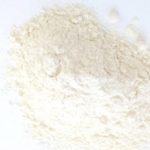A study published in the Journal for Food Protection found that most people treat flour as if it is safe. But do you know that raw flour can contain dangerous pathogens such as E. coli and Salmonella? In 2019 there were many recalls of flour for possible E. coli contamination, including the brands Robin Hood, Gold Medal, Wild Harvest, Hodgson Mills, Pillsbury, and King Arthur. And an E. coli O26 outbreak that sickened at least 21 people in nine states was linked to ADM Milling flour, which produced Aldi, Pillsbury, and King Arthur flour. The study, which was a survey conducted online by participants recruited in May 2019, found that consumers do not consider flour a high risk for microbial contamination. More than 80% of those surveyed were unaware of flour outbreaks or relays, … [Read more...]
MMWR on Multistate Outbreak of E. coli O26 Infections Linked to Raw Flour
Most consumers do not recognize that raw, or uncooked, flour, is considered a health risk as this item is a raw agricultural product that has not undergone a kill step to eliminate pathogens. In the April 23, 2021 issue of the CDC's Morbidity and Mortality Weekly Report (MMWR), a study is presented that looked at the 2019 multistate outbreak of E. coli O26 linked to raw flour. On February 20, 2019, PulseNet identified six Shiga toxin-producing E. coli O26:H11 infections with the same DNA fingerprint. This pattern matched infections from a July 2018 outbreak that was associated with ground beef. The Centers for Disease Control and Prevention (CDC) launched an investigation to identify the outbreak source. Investigators first thought the outbreak was linked to ground beef because … [Read more...]
Consumer Knowledge About Flour Risks Lags Behind Reality
Consumer knowledge about flour risks lags behind reality, according to a research article published in the International Association for Food Protection. The research finds that consumers do not consider flour a high risk for bacterial contamination, but flour is a raw agricultural product and a source of outbreaks. Six food poisoning outbreaks have been linked to wheat flour and flour products in the U.S. and Canada since 2009. Those outbreaks have sickened at least 200 people with Salmonella and E. coli bacteria. In 2019, an E. coli O26 outbreak linked to ADM Milling flour sickened at least 21 people in 9 states. The flour brands that were recalled in association with that outbreak included Pillsbury bread flour, ALDI Baker's Corner, and King Arthur flour. And in 2016, an E. … [Read more...]
Home Treated Flour May Not Be Safe Says Purdue Researcher
The risks of uncooked flour have been well documented through studies and food poisoning outbreaks linked to that ingredient. But many recipes, especially older ones, call for using flour that is not cooked. To be able to make these recipes without the risk of food poisoning, many sites have been advocating that home cooks treat their own flour. But a Purdue researcher says that home treated flour may not be safe after all. The typical "recipe" for treating raw flour at home is to spread it on a pan and microwave it or bake it in the oven until it reaches 160°F, the temperature at which E. coli and other pathogens are destroyed. Purdue food scientist Yoahua "Betty" Feng states that those treatments are not guaranteed to make the flour safe. She says that while heating meats or … [Read more...]
Avoid Making and Serving These Potentially Dangerous Holiday Foods
Every year people are sickened by certain types of foods. Avoid making and serving these potentially dangerous holiday foods this season. Some are inherently dangerous, and others are easily contaminated with dangerous bacteria. The potentially harmful foods include cannibal sandwiches, raw cookie dough, eggnog, unpasteurized cider, and raw oysters. Cannibal sandwiches are sandwiches made with raw ground beef. They are a specialty in some areas of the Midwest United States. In 2013, an E. coli O157:H7 outbreak in Wisconsin was associated with the seasonal consumption of these sandwiches. Raw ground beef is inherently risky, because cows carry pathogenic STEC bacteria in their guts. When the cows are slaughtered, the bacteria are released and can contaminate the beef. When this beef … [Read more...]
Food Allergens Can Become Airborne: How to Handle the Risk
Food Poisoning Bulletin constantly reports on food recalls for the eight major food allergens: peanuts, tree nuts, milk, fin fish, shellfish, wheat, eggs, and soy. Those eight allergens together cause at least 30,000 emergency room visits, 2000 hospitalizations, and 150 deaths in the U.S. every year. Recently we became aware that some foodborne allergens can become airborne. Some of the allergens are more of a risk than others. For instance, peanut allergens usually do not become airborne, and allergic reactions are not triggered from peanut butter vapors, according to a study published in the American Academy of Allergy, Asthma, and Immunology. Since peanuts allergies are typically more severe and more likely to trigger anaphylactic shock, this is a relief. Some other food … [Read more...]
Tips For Handling Flour Safely to Avoid Food Poisoning
When an E. coli O157:H7 outbreak in 2009 was linked to the flour used in prepackaged cookie dough, many people were shocked. How could flour, which seems so innocuous, actually be contaminated with such a serious pathogen? Flour is dry. It seems inert and safe. But flour is a raw agricultural product, and can be contaminated with pathogens just like romaine lettuce. Learn some tips for handling flour safely to avoid food poisoning. Flour is so ubiquitous in the kitchen that many people don't give it a second thought. But an E. coli O26 outbreak last year linked to Aldi's Baker's Corner, Pillsbury bread, and King Arthur Flour sickened 21 people in 6 states. And in 2016, an E. coli O121 and O26 outbreak linked to recalled General Mills flour sickened 63 people in 24 states. Not … [Read more...]
It’s National Pizza Week: Are Pizzas Linked to Outbreaks?
It's National Pizza Week! Have pizzas been linked to any food poisoning outbreaks in the U.S.? The answer is yes. The ingredients in pizza that could be problematic include flour in the dough, cheeses, produce such as leafy greens, and any type of meat toppings. But since pizzas are usually cooked so thoroughly, how can people get sick? There are three answers to that question: handling the pizzas before they are cooked, cross-contamination, and microwave cooking. Raw dough is considered a risky food, since flour used to make it has long been associated with E. coli O157:H7 outbreaks, from the Nestle raw cookie dough outbreak in 2009, to the General Mills flour E. coli outbreak in 2016 that sickened 63, to the E. coli O157:H7 outbreak linked to ADM Milling flour last year that … [Read more...]
Learn How to Handle Flour Safely in Holiday Baking to Avoid Illness
It's time to make Christmas and Hanukah desserts, including cookies, cakes, and pies. Everyone should learn how to handle flour safely during the holiday baking time with tips from the FDA. Flour is a raw food. Most people don't realize that because it is processed, but it's a raw agricultural product. Wheat is grown outdoors, and can be exposed to many different types of pathogens, including E. coli and Salmonella. Unfortunately, processing raw grains into flour doesn't kill these pathogens. Eggs, too, are another health risk. Raw eggs can be contaminated with Salmonella; in fact, there have been quite a few food poisoning outbreaks over the years linked to eating raw or undercooked eggs. As with flour, cooking to a safe final temperature is the only way to destroy pathogens on … [Read more...]









